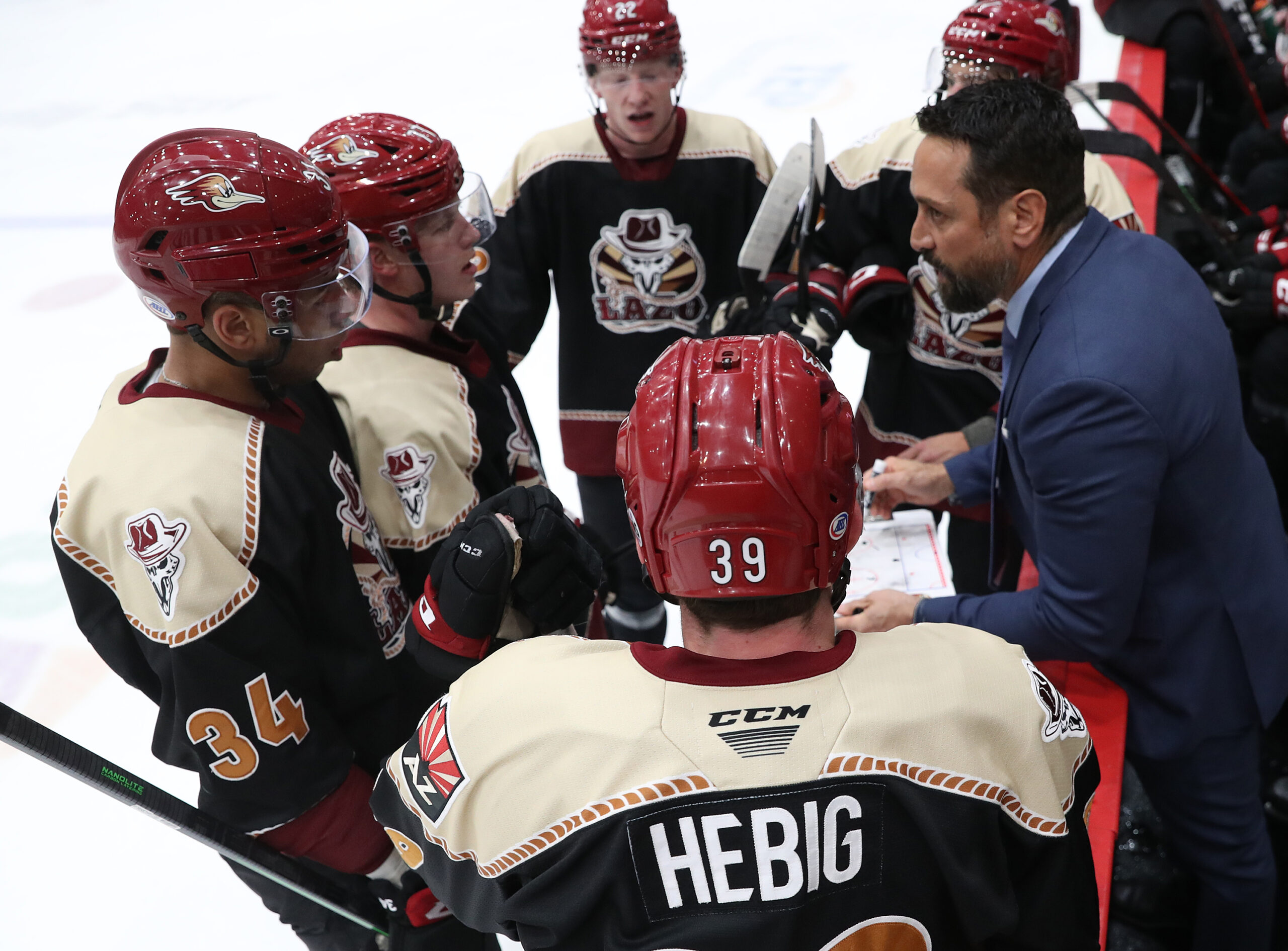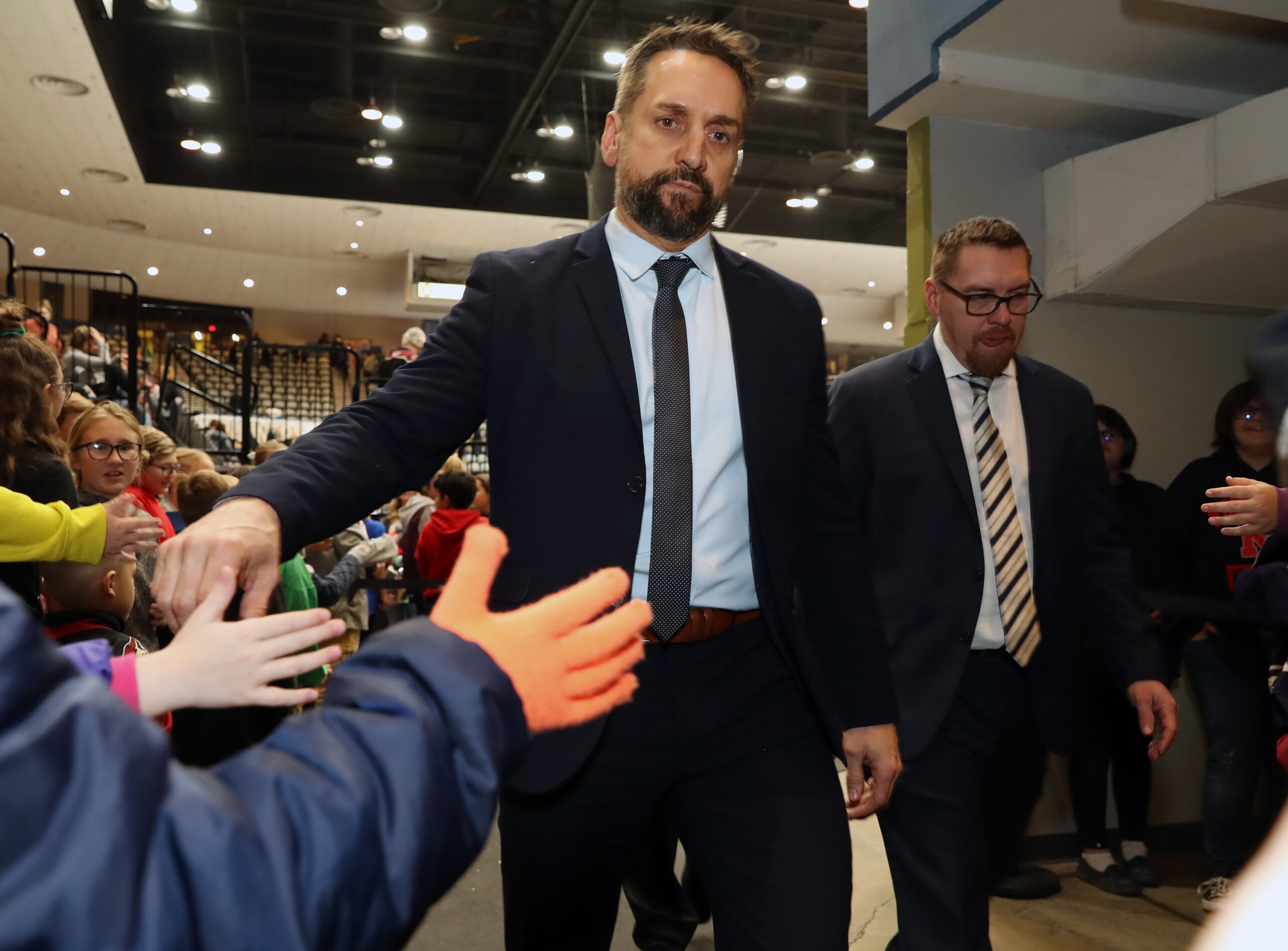© 2025 ALLCITY Network Inc.
All rights reserved.

Among the many skills that Conor Garland needed to improve before securing a permanent spot in the NHL was adding velocity to what he termed a “weak shot.” Steve Potvin was his willing partner as the Coyotes skills coach in 2016-17, and as a Tucson Roadrunners assistant coach in 2017-18; Garland’s last full season in the AHL.
“He used to hold my stick with a bungee cord and work on the resistance for it, or we’d shoot weighted pucks to build up my strength, or we used to shoot these massive amounts of pucks off a wall in the Zamboni room,” Garland said.
The drills that Potvin designed helped improve Garland’s shot, Garland appreciated the many helpful tips that Potvin provided in other areas, and by now, every Coyotes fan knows the impact that all of that development had on Garland’s electric entrance to the NHL.
It wasn’t the skills development that sold Garland on Potvin, however.
“It was more that he just gave you his time even when he was driving from Phoenix or Scottsdale where he lives,” Garland said. “It’s two hours from Tucson and he’d be the last guy to leave because I was always the last person to leave and he never blew me off. It’s insane to think of how many hours he spent there and then he would be waking up the next morning at 5 a.m. just to get back to the rink at 7 while I had an eight-minute ride home.
“In a business where you are just an asset that the team wants to use, or an asset that the team wants to trade to get someone else back, he always had this way of making you feel like you were not just that asset. You really feel like he cares about you and he cares about where your career ends up. He is not doing it to look good or to get good reviews at the end of the year. Look at how many guys have gone up to the NHL that worked with him and that were really close to him. Guys really like him, and they trust him because he genuinely cares.”
Those qualities were paramount in the Coyotes’ decision to hand Potvin the Tucson coaching reins with a multi-year contract after Jay Varady left the organization to take an assistant coaching job with the Detroit Red Wings one month ago.
The Coyotes drafted six players in the first three rounds of the 2021 NHL Draft, and they own a whopping 22 picks combined in the first three rounds of the next four drafts. Potvin will play a critical role in the development of those prospects, and the future of the franchise.
“We’ve got some tremendous young talent coming through the door,” Coyotes GM Bill Armstrong said. “We wanted to make sure that we had a good coach, a coach that would help develop them, see the best in them, and push them. I believe from watching Steve do his work as an interim coach here before, he did an outstanding job.
“The biggest thing I learned is how much he cared about the players and there was a great relationship between the player and him where he can be firm and demanding but at the same time, there’s a likeability factor. You have to have that in the American league.”

(All photos courtesy of Tucson Roadrunners)
Potvin had some head-coaching experience with the Jr. Coyotes after his retirement as a player in 2010, but he only had one year as the Coyotes skills coach and three years as a Roadrunners assistant under his belt before he got his first taste of professional head coaching.
Potvin served as the Roadrunners head coach for one season when Varady was elevated to the Coyotes bench for the 2020-21 bubble season in which teams employed taxi squads and needed an extra hand on deck. It was an eye-opening experience, and when Varady returned to the Tucson bench last season, it afforded Potvin the opportunity to take a step back and take stock of what he had learned.
“When you’re the assistant coach, you can stand back and watch, but when it’s actually live and you have to dig into your own resources, emotions and your feel for the game and the team, it’s not always that easy,” he said. “That’s what I think I learned or appreciated the most was being able to be out there in front of the team and really feel what it’s like; to learn what style works for you and what’s going to reach the guys the best.”
“In the end, I think it did change my approach, but only slightly; not as much as I would have thought,” he said. “I think it was more the realization that you have to just be relentless and confident and make sure that you’re putting the players first. I want them to feel my energy and passion for the game. I think that’s what drives the players.”
Potvin has a wealth of experiences upon which to draw. He played three seasons in the OHL that he admits he may not have deserved. Through sheer will and hard work, he ended his OHL career with a 32-goal, 89-point season with Niagara in 1994-95. The dream was, of course, to play in the NHL, but after four seasons of bouncing around the IHL, ECHL and AHL, Potvin had a moment of clarity that still guides him today.
“You get to a certain point where you have a choice,” he said. “You’re either going to join the grind and stay on your path and try to do everything you possibly can to play in the NHL, or you make a choice to get to a league where you’re going to have success. I found a league that I could have success in and be the player that I wanted to be.”
Potvin spent the next decade of his career playing in four European nations (Germany, Switzerland, Sweden, Denmark) and five different leagues where he was mostly a point-per-game player. All of those experiences opened Potvin’s mind to different cultures, different belief systems and different values. At the same, he was unwittingly preparing himself for a life of coaching by observing the different ways in which each nation trained and treated its players, and the different systems and styles that each nation employed on the ice.
“Some of our players are coming or will come from Europe and he’s played in places like that; played in their countries,” Tucson GM John Ferguson Jr. said. “He was an import going the other direction, so understands how it can take some time to learn a new language, learn a new culture, and to integrate and become a teammate, but also, he knows their cultures, understands them and how they do things. That gives him a broad perspective for understanding players both from North America, and also from abroad.”

At the core of Potvin’s coaching philosophy is a simple pursuit.
“I love seeking the truth,” he said. “Without the truth, there’s no forward progression.”
Garland learned that firsthand.
“He would call me all the time when I was up in the NHL,” Garland said. “‘It was like, ‘Hey, G, you played 11 minutes last night. How are you doing?’ I’d be like, ‘You know. I’m angry’ or ‘I think Toc is upset with me.’ He’d talk me through why I was thinking that and by the end of the conversation, I’m like, ‘You know what? It is my fault.’ He would do it in the nicest way but he always got you to see the truth and you’d realize. ‘It’s not Toc’s fault. It’s my fault. I’m not playing well.’ And then he’d hang up and go coach the Roadrunners the next night.”
It’s that ability to deliver a hard message in a soft tone that defines Potvin to many who have worked with him.
“He is a funny guy, he’s a good guy and he’s down to earth, but he has that switch that he can flip where you realize this is gonna be a serious talk now,” said former Roadrunners head coach and current St. Louis Blues assistant Mike Van Ryn, who brought Potvin aboard his staff in 2017 after working with him in development for a year with the Coyotes.
“Usually, guys are one or the other, but he’s got a way about him where he can kind of mix both. I think a lot of that comes just from having worked his way up through minor hockey. He understands the younger players today and when I coached there he did a great job with Garland, a kid that was right out as juniors, but he’s also able to connect with the veterans and I think that just comes from the fact that he has played and coached in so many different situations so he has experienced everything there is to experience.”
Potvin understands the crucial role that he may play in the development of high-end prospects such as Dylan Guenther, Conor Geekie, Maveric Lamoureux or maybe even Logan Cooley, but he also sees opportunity with this year’s team, whether it’s helping prospects Jan Jeník, Victor Söderström, Matias Maccelli and Ben McCartney take the next step, or grooming 37-year-old forward Adam Cracknell for his next career in coaching.
“I really think that all these guys can play in the NHL,” Potvin said. “It’s their thoughts and limiting beliefs that really derail their path. You have to stay with it. You have to go right alongside them and say, ‘Hey, this is not going to wear me down. I’m going to find a way to get you back on this path. We’re not going to stop until you get there or until you actually choose not to.’
“I’m looking forward to that challenge the most. I think that my biggest strength is understanding what the player is going through, no matter what stage of his career he’s at, and then seeking the truth and understanding exactly what he needs and what is preventing him from taking that next step. Honestly, that’s the most challenging and the most rewarding part of it. When you gain trust with these guys and then they do take that next step, it is such a rewarding feeling as a coach. That’s really what a coach is. You have to find the best way to help these guys grow.”
Follow Craig Morgan on Twitter
Comments
Share your thoughts
Join the conversation



